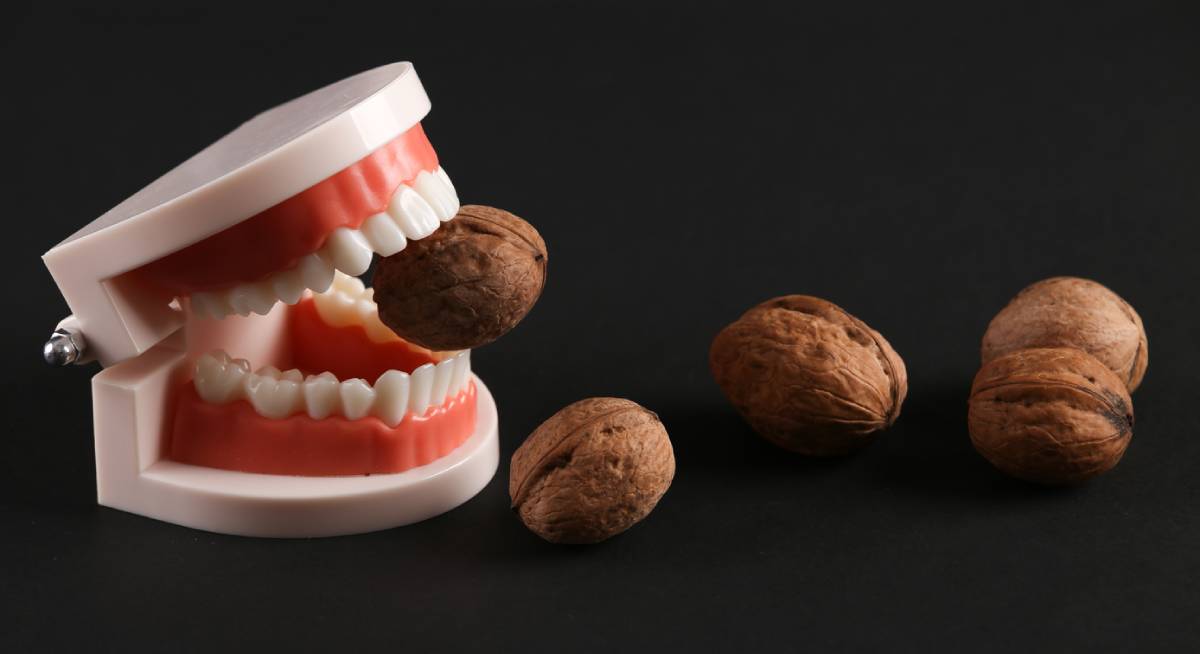Porcelain veneers are an effective cosmetic solution for a variety of dental issues, such as teeth discoloration, chips, cracks, or even gaps between the teeth. But are veneers easy to break? Read our article to learn how to avoid breaking your veneers and learn other veneer care tips.
Are Veneers Easy to Break?
The durability of your veneers typically depends on two main factors:
- The material your veneers are made of: porcelain dental veneers are typically much more durable than those made of resin composite.
- Your lifestyle and dietary habits
How to Avoid Breaking Your Veneers
Even though porcelain veneers are reasonably durable, you still need to keep in mind several rules that will help you avoid breaking them:
Adjust Your Dietary Habits
We recommend avoiding hard, crunchy foods or foods that require a lot of bite force, such as crackers, hard apples, popcorn with seeds, meat on bones, hard candy, etc. Additionally, abstain from sticky foods, such as toffee or caramel candy.
Wear a Mouth Guard
Some activities, like contact sports or sports that pose a risk of falling, can cause oral trauma or hard impact to the face. Such injuries can break or crack your veneers. Dentists recommend wearing a mouth guard when you engage in such activities. Mouth guards are effective at absorbing the force from the impact, thus protecting your veneers and natural teeth from breaking.
Do Not Use Your Teeth as Tools
Never use your teeth to open bottles, crack nuts, etc. Also, avoid chewing on hard objects, such as pens, nails, etc. These habits can easily scratch, crack, or break your dental veneers, as well as your natural teeth.
Other Veneer Care Tips
To preserve the original color and appearance of your veneers, we recommend following these simple rules:
Prioritize Your Oral Hygiene
Good oral hygiene helps prevent cavities and gum disease—both factors that can threaten the integrity of your veneers. Also, if bacteria and food residue are not removed from the teeth regularly, they can accumulate on your veneers over time, making them appear stained or darkened.
An effective oral hygiene routine consists of brushing your teeth twice a day, flossing every evening, and using a water flosser. Dentists advise spending at least two full minutes brushing your teeth, making sure to clean them on the front, back, and along the chewing surface. Flossing helps remove food debris and plaque that accumulate between the teeth, where it is hard to clean with a toothbrush.
If you find it challenging to use a traditional flossing thread with veneers, try using specialized floss threaders. A water flosser can be a great addition to your routine, too, as it is effective at removing plaque and bacteria along the gum line and in hard-to-reach areas in the mouth. Dentists recommend patients use a water flosser as the first step in their hygiene routine.
Choose the Right Products
The products you choose to clean your veneers can significantly influence their longevity and appearance. Thus, we recommend avoiding abrasive toothpaste and hard-bristled toothbrushes. Abrasion can create minor scratches on the surface of your veneers. They will most likely not be visible to the naked eye. However, food and beverage residue and bacteria can accumulate inside the scratches over time, making your veneer appear stained or discolored.
It is also not advisable to use over-the-counter whitening solutions on your veneers. The whitening agents that these products contain are designed for a more porous enamel of natural teeth and are not compatible with the materials from which dental veneers are made.
Additionally, we do not recommend using mouthwash that contains alcohol or die. Colored mouthwash can stain your veneers.
Instead, choose a toothpaste that contains fluoride—an element that is proven to be effective at strengthening the enamel and fighting the bacteria in the mouth, preventing its growth.
Avoid Staining Foods and Beverages
Porcelain is a relatively stain-resistant material, but it is still advisable to abstain from staining foods and beverages, such as:
- Red wine
- Black coffee and tea
- Beetroot, carrots, etc.
- Curry, paprika, and other brightly colored spices
- Soda and other drinks containing dye
- Berries
- Fruit and vegetable juices
When you consume any staining foods or beverages, make it a habit to rinse your mouth or brush your teeth, if possible, right after the meal.
Get Stunning Veneers at The Smile Artist LA Dental Office
Make an appointment with a leading cosmetic dentist at our office today. Our specialist will help you choose the most suitable dental veneers that will address your cosmetic or oral health concerns and goals.



 )